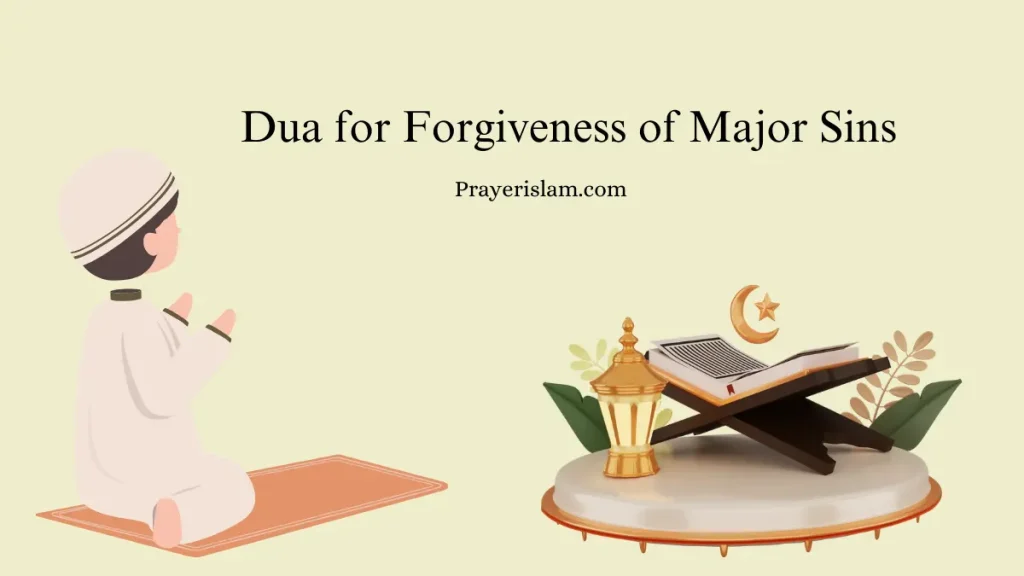In Islam, the concept of seeking forgiveness (Tawbah) is central to a believer’s relationship with Allah. Every human is prone to mistakes and sins, but Islam offers a way to cleanse the heart and soul through sincere repentance. Dua is a powerful means to ask for forgiveness, allowing us to seek Allah’s mercy for all sins, whether major or minor. This article will explore various aspects of making dua for forgiveness, the importance of repentance, and provide specific supplications for those seeking to purify their hearts.
Understanding Sin and Forgiveness in Islam
Sin in Islam refers to actions that go against the commands of Allah. Sins are broadly categorized into major (Al-Kaba’ir) and minor (As-Sagha’ir) sins. Major sins include actions like shirk (associating partners with Allah), theft, and murder, while minor sins are less severe. However, both types of sins can distance a believer from Allah, making it crucial to seek forgiveness regularly.
The Importance of Tawbah (Repentance)
Tawbah, or repentance, is the process of turning back to Allah after committing a sin. It involves feeling genuine remorse for the sin, immediately stopping the sinful act, seeking forgiveness from Allah, and resolving never to commit the sin again. Tawbah is a powerful way to cleanse the soul and renew one’s commitment to living a righteous life.
The Power of Dua in Seeking Forgiveness
Dua is a direct communication with Allah. It is a way to express our remorse, ask for forgiveness, and seek guidance. When made with sincerity and humility, dua can lead to the complete forgiveness of sins, no matter how grave they may be. Allah loves those who turn to Him in repentance and is always ready to forgive.
Dua for Forgiveness of All Sins
There are several powerful duas that the Prophet Muhammad (peace be upon him) taught for seeking forgiveness. One of the most comprehensive duas for forgiveness is:
“Allahumma inni as’aluka bi-annaka Antal-Ghafoorur-Raheem, an taghfira li dhanbi, warhamni.”
(“O Allah, I ask You, because You are the Most Forgiving, Most Merciful, to forgive my sins and have mercy on me.”)
This dua is a general supplication that covers all sins and appeals to Allah’s attributes of forgiveness and mercy.
Sincerity in Seeking Forgiveness
For a dua to be effective, it must be made with complete sincerity. The believer must truly feel remorseful for their sins and have a firm intention not to return to the sinful behavior. Sincerity in dua is key to attaining Allah’s mercy and forgiveness.
The Best Times to Make Dua for Forgiveness
Certain times are considered more auspicious for making dua, such as the last third of the night, during sujood (prostration) in Salah, after the obligatory prayers, and on Fridays. Making dua during these times can increase the likelihood of it being accepted.
Combining Dua with Good Deeds
While making dua for forgiveness is important, it is equally important to follow it up with good deeds. Acts of charity, kindness, and increasing acts of worship can help in erasing sins and drawing one closer to Allah. The Prophet Muhammad (peace be upon him) emphasized the importance of following up a bad deed with a good one to wipe it out.
The Role of Istighfar (Seeking Forgiveness)
Istighfar, or the act of seeking forgiveness, should be a regular practice for every Muslim. It can be done at any time, and the Prophet Muhammad (peace be upon him) would often say, “Astaghfirullah” (“I seek forgiveness from Allah”) multiple times a day. Regular istighfar helps in cleansing the heart and keeping a believer connected to Allah.
Never Losing Hope in Allah’s Mercy
No matter how many sins a person has committed, they should never lose hope in Allah’s mercy. Allah says in the Quran:
“Say, ‘O My servants who have transgressed against themselves [by sinning], do not despair of the mercy of Allah. Indeed, Allah forgives all sins. Indeed, it is He who is the Forgiving, the Merciful.’” (Surah Az-Zumar, 39:53)
This verse reminds believers that Allah’s mercy is greater than any sin they may commit.
Transforming Sins into Good Deeds
One of the greatest mercies of Allah is that He can transform the sins of a believer into good deeds if they sincerely repent. This is mentioned in the Quran:
“Except for those who repent, believe, and do righteous work. For them, Allah will replace their evil deeds with good. And ever is Allah Forgiving and Merciful.” (Surah Al-Furqan, 25:70)
This verse offers hope and encouragement to those who seek to turn their lives around and commit to a path of righteousness.
FAQs
1. What is the difference between major and minor sins in Islam?
Major sins are severe and have specific punishments prescribed in Islamic law, while minor sins are less severe and are often forgiven through regular acts of worship and good deeds.
2. Can all sins be forgiven?
Yes, all sins can be forgiven if a person sincerely repents, seeks forgiveness, and resolves not to commit the sin again. Allah’s mercy is vast, and He forgives all sins for those who sincerely turn to Him.
3. How often should I seek forgiveness?
Seeking forgiveness should be a regular practice. The Prophet Muhammad (peace be upon him) sought forgiveness multiple times a day, teaching us the importance of continually turning to Allah.
4. What should I do if I commit the same sin repeatedly?
If you commit the same sin repeatedly, continue to seek forgiveness each time with sincerity. Work on understanding the triggers that lead to the sin and make efforts to avoid them. Remember, Allah is always ready to forgive those who sincerely repent.
5. Is there a specific dua for seeking forgiveness for all sins?
Yes, one such dua is: “Allahumma inni as’aluka bi-annaka Antal-Ghafoorur-Raheem, an taghfira li dhanbi, warhamni.” This is a comprehensive supplication asking for forgiveness of all sins.
6. How can I ensure my dua for forgiveness is accepted?
To ensure your dua is accepted, make it with sincerity, humility, and a firm resolve not to return to the sin. Also, try to make dua during auspicious times and follow it up with good deeds.
7. Can I seek forgiveness in my own language?
Yes, you can seek forgiveness in any language. What matters most is the sincerity of your heart and your intention.
8. Is it necessary to cry when making dua for forgiveness?
Crying can be a sign of sincerity, but it is not necessary for the acceptance of dua. The most important aspect is the condition of the heart and the intention behind the dua.
9. Can good deeds erase sins?
Good deeds can erase minor sins, but major sins require sincere repentance. However, performing good deeds can help in the process of seeking forgiveness and bring one closer to Allah.
10. What role does consistency play in seeking forgiveness?
Consistency is key in seeking forgiveness. Regularly making istighfar and dua for forgiveness keeps a believer’s heart clean and maintains a strong connection with Allah.







